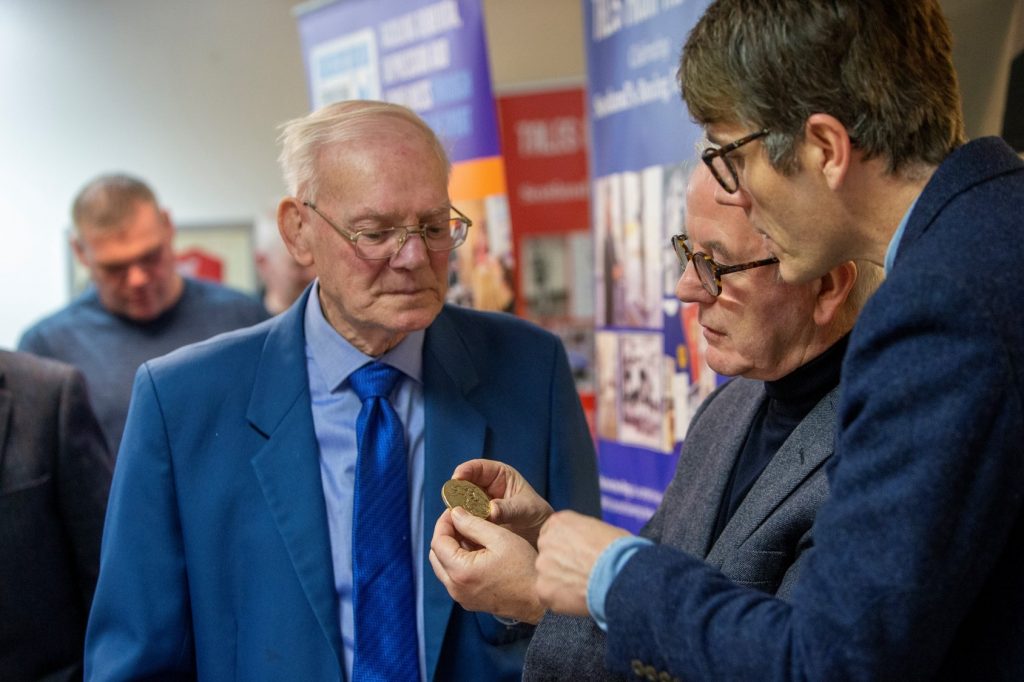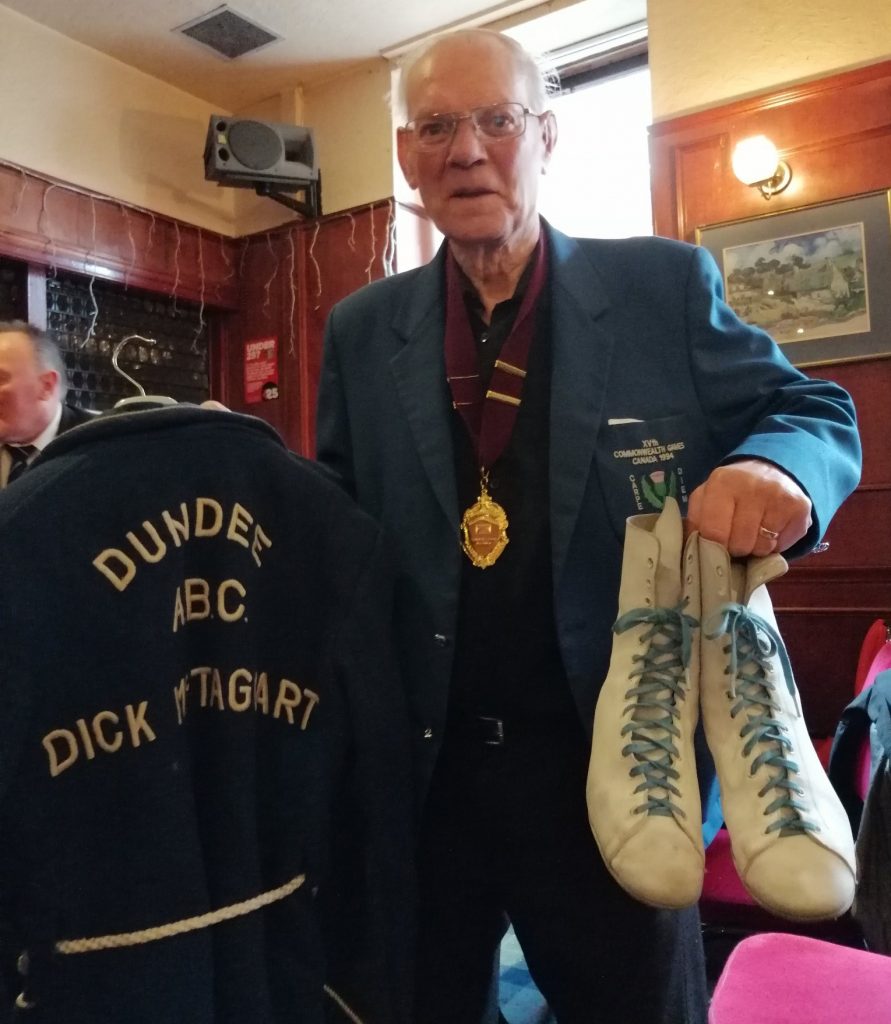Olympic boxing robe and white boxing boots, 1960
“I think I was clever enough and I was taught to box all the time. I wasn’t taught to fight and being a southpaw, I had an advantage. I was five foot nine and a half inches which is quite tall for a nine stone seven pound fighter. I had long arms.”
Dick McTaggart (2019)
In an amateur career that spanned the years 1954-1965 Dick McTaggart fought at lightweight (1954-1961) and light welterweight (1962-65). His remarkable record of 634 bouts with 610 wins and only 24 loses led to him recently being placed at six in a poll of the world’s top amateur boxers of all time. In a glittering amateur career he won Olympic, European and Commonwealth gold medals. Watching old Movietone and Pathe film of McTaggart boxing highlights his skills as a fighter and how he used the ring to his advantage.
One of a family of eighteen children Dick and his brothers would often fight with one another in the house.
“One day Dad decided enough was enough and told us that if we wanted to fight we were going to the boxing club.”
Dick McTaggart (2019)
In 1948 his boxing career began at his local gym in Dundee. His talent was spotted early as he won the Belmont Youth Club boxing trophy in the same year. He continued to compete in junior and youth matches, but it was not until he joined the Royal Air Force in 1953 that he began to concentrate more seriously on his boxing career, winning the RAF championship in 1954. During his military service his boxing career flourished winning the RAF title five years running and the Armed Forces Championship in 1954, 1955, 1956 and 1958.
The experience gained by Dick during his military bouts contributed to his early success as an amateur. In April 1956 he reached his first ABA final against fellow Scot E. Kane, winning the bout on points. The same bill also featured title-winning fights by three other Scottish boxers, Owen Reilly, John McCormack and Davie Mooney. An active member of the Scottish Ex-Boxers Association Dick still regularly meets up with Mooney at the association’s regular monthly meetings.
Following his ABA success Dick was selected for the Great Britain boxing team to compete at the 1956 Olympic Games in Melbourne, Australia. He won gold in the lightweight division and was also awarded the Val Barker Trophy for the most stylish boxer at the Games (he remains the only British boxer to be awarded the Val Barker Trophy).
“We were there a week before the competition started. We trained every day, morning, noon and night. The main thing is to get yourself fit first, there is no use in going in if you are not fit. I was really, really, fit by the time the Olympics came along. I only had four contests in the Olympics but my opponent had five. My opponent in the final was the German Harry Kurschat, I had him down twice in the first round. They said I couldn’t punch but I managed to get him down. Mind you he kept coming back as strong as ever. Its murder when you put a guy down like that and he gets up and starts again it’s frightening.”
“Everyone sets out to win a medal. To start with its lasting the pace, and then when you get to a certain stage – after I got past the first two bouts – then I decided I’m going for gold. Winning the gold medal was like winning the lottery.”
“When I came home and got off the train there was hundreds and hundreds of people, I think it was all the way up the street from the station until my house in Dens Road. It was fantastic, tears were running down from my eyes I couldn’t believe it.”
Dick McTaggart (2019)

In 1958 Dick followed his Olympic success with gold at the Commonwealth Games, defeating Jim Jordan of Northern Ireland in the lightweight final. 1958 proved a remarkable year for Dick winning the Scottish ABA, Royal Air Force, Imperial Services and ABA championships as well as his Commonwealth gold.
International competition continued in 1959 as Dick represented Scotland in matches against England, Romania, the USSR, Wales and Ireland, and was undefeated in all bouts. However he was less successful in 1959’s European Championship, losing in the first round to Gennadiy Kakoshkin of the USSR.
1960 began with a win against Johnny Cooke in January’s Scotland v England international match. In March he travelled to Romania where he defeated Iosif Mihalic. In April he won his third ABA title defeating Cedric Williams of Wales. His successes led to Dick being selected for a second time to represent Great Britain at the Olympics. Prior to travelling to Rome for the competition Dick’s local club Dundee ABC presented him with a boxing robe emblazoned with the Olympic rings in recognition of his achievements. They also presented him with a pair of stylish white boxing boots.
“I was very proud to be awarded these items and I was one of the first Scottish boxers to wear white boots. I was a trend-setter.”
Dick McTaggart (2019)

Reflecting on his second Olympics Dick was disappointed not to win gold. He made it to the Semi-finals but lost to Kazimierz Pazdzior of Poland on a split decision and had to settle for a bronze medal. The defeat led to Dick announcing his retirement from Boxing at the age of 25. Fortunately for boxing fans this was to be a short-lived retirement. However despite his own disappointment, Dick’s fondest memory of the 1960 Rome Olympics was the success of fellow Scot, Willie Fisher, who won bronze in the light middleweight competition.
On his return from his premature retirement from the ring Dick was faced with the challenge of a box-off against Jim Lynch to see who would be selected to represent Scotland at the 1961 European Championships. The bout was added to the bill of a Scotland v Italy Under 21 match held in St Andrews Hall, Glasgow, on Wednesday 4th of May.
The most important bout however was not in the international, for R. McTaggart (Dundee), back after a year in retirement met J. Lynch (Glasgow Transport) in a special contest to decide who would represent Scotland in the European championships next month in Belgrade. McTaggart must have left no doubt in the minds of the selectors. The former Olympic gold medallist had lost none of the elegance and culture that were the hallmark of his performances before he retired. His right lead dominated the contest and his adroit use of the ring and his scientific defence served him well when in the last round Lynch, having been outboxed for the first two made a desperate effort to pull the fight his way.
Glasgow Herald, 5th May 1961
Dick went into the 1961 European Championships, which were held in Belgrade, confident of success.
“I was really fit for that championship, I was getting older and I knew I had to be a lot fitter.”
Dick McTaggart (2019)
He won gold, defeating the home favourite Peter Benedek (Yugoslavia) in the final. The victory added a European gold to his Olympic and Commonwealth successes.
BOXING – THIRD GOLD MEDAL FOR R. McTAGGART – EUROPEAN TITLE, BELGRADE, SUNDAY
R. McTaggart (Dundee) probably the best amateur boxer Scotland has ever produced, completed a set of Gold Medals last night when he won the European Lightweight title by outpointing P.Benedek (Yugoslavia) in the final. McTaggart’s other gold medals were won in the Olympic Games at Melbourne in 1956 and the Empire and Commonwealth games at Cardiff in 1958. McTaggart’s display of skilful controlled boxing was far too much for Benedek and brought Scotland her first gold Medal in these championships since J. McKenzie won the fly-weight at the inaugural meeting in 1924. There was no doubt about the decision which was accepted with hardly a murmur from the fiercely partisan crowd of nearly 10,000.
McTaggart with the experience of nearly 300 bouts behind him, won the first and last rounds by wide margins, scoring regularly with right leads and sidestepping and landing right hooks or left crosses every time the tough courageous Benedek attacked. Benedek, however gave the home crowd a joyous two minutes in the second round when he repeatedly caught the wily scot with hard right crosses. Only McTaggart’s ringcraft took him through that spell capable of recovering in a minute and resuming his boxing lesson.
Glasgow Herald, 12th June 1961
Winning the European Championship had reinvigorated Dick’s desire to carry on with his boxing career. However in early 1962 he realised that at the age of 27 he was one of the elder statesmen of the Scottish Boxing team and was finding it difficult to make the lightweight limit of 9st 7lbs. He moved up to light-welterweight and represented Scotland at the 1962 Commonwealth Games in Perth, Australia, winning silver to add to his growing collection of medals..
“Oh I remember that, I went all the way to the final again and I’m fighting this bloke and I thought I’d won every round clear. Harry Carpenter said it looks like Dick McTaggart has won another gold. Anyway when they gave the decision, the other boy got the decision and he actually fainted. He was out for a few minutes with the shock of getting the result. I was very disappointed”.
Dick McTaggart (2019)
In 1963 Dick won his fourth ABA Championship title and competed in his fourth and final European Championships in Moscow. Once again, he was the elder statesman of the five-man Scotland team. He oversaw young talents like Ken Buchannan, Evan Armstrong, Malcolm McKenzie and Andy Wyper in their first major championships. Once again there was disappointment for Dick as he lost out to West German boxer Gerhard Dieter in the Quarter-finals.
1964 was Olympic year and Dick competed in his third Olympic Games in Tokyo (still the only British boxer to compete in three Olympics). It was to be the final major championship appearance of his illustrious career. The disappointment of losing in the second round to Jerzy Kulej of Poland was tempered by the fact that Kulej went on to win the gold medal.
In 1965 Dick made ABA boxing history when he won his fifth ABA Championship. In doing so he equalled a record set 30 years previously by Fred Mallin. Their joint record would finally be eclipsed in 1988 when John Lyon won his sixth ABA title. This was to be Dick’s final championship win as he announced his retirement from boxing in the same year.
“I was getting old and was suffering injuries. Best to go out at the top.”
Dick McTaggart (2019)
Looking back over his long and distinguished career as an amateur Dick has often been asked why he never turned professional.
“I had plenty of offers to turn professional. There’s a few times when I thought about turning professional. Money wise was trying to drag me but I said I’ve been amateur all this time, so I’ll just stay amateur. I’m one of the top amateurs in the world.
I didn’t fancy going professional, fighting 8 or 10 rounds, I liked to lead a normal life as well. If I wanted to go for a pint then I would. You can’t do that as a pro. If you want to do good, then as I say you have to be 100%. It’s a hard game being a professional.
Dick McTaggart (2019)
This blog is based on an interview with Dick McTaggart which took place in Troon on 14th November 2019 as part of the Tales from The Ring project.
Ian Mackintosh, Project Officer